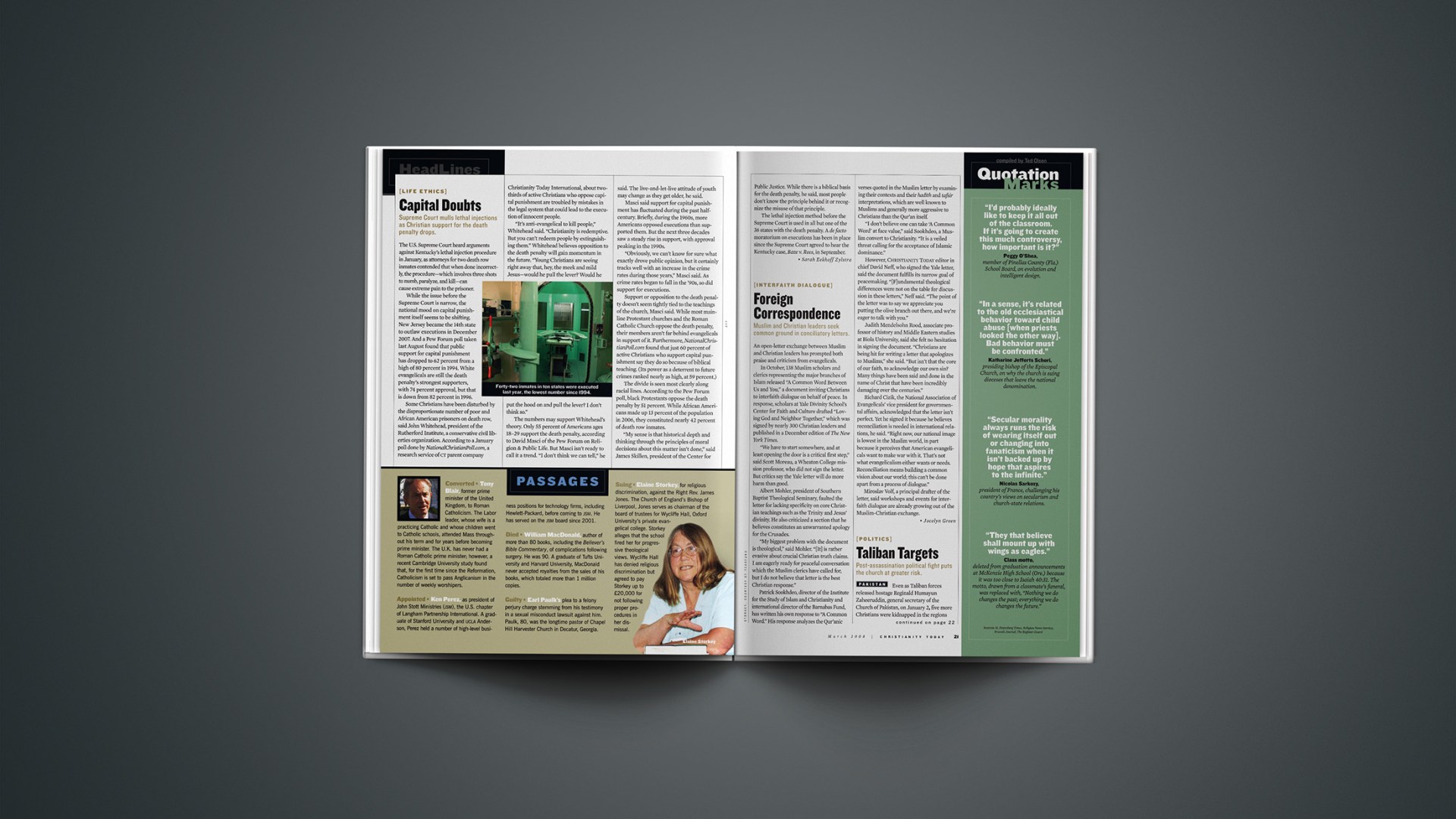An open-letter exchange between Muslim and Christian leaders has prompted both praise and criticism from evangelicals.
In October, 138 Muslim scholars and clerics representing the major branches of Islam released “A Common Word Between Us and You,” a document inviting Christians to interfaith dialogue on behalf of peace. In response, scholars at Yale Divinity School’s Center for Faith and Culture drafted “Loving God and Neighbor Together,” which was signed by nearly 300 Christian leaders and published in a December edition of The New York Times.
“We have to start somewhere, and at least opening the door is a critical first step,” said Scott Moreau, a Wheaton College mission professor, who did not sign the letter. But critics say the Yale letter will do more harm than good.
Albert Mohler, president of Southern Baptist Theological Seminary, faulted the letter for lacking specificity on core Christian teachings such as the Trinity and Jesus’ divinity. He also criticized a section that he believes constitutes an unwarranted apology for the Crusades.
“My biggest problem with the document is theological,” said Mohler. “[It] is rather evasive about crucial Christian truth claims. I am eagerly ready for peaceful conversation which the Muslim clerics have called for, but I do not believe that letter is the best Christian response.”
Patrick Sookhdeo, director of the Institute for the Study of Islam and Christianity and international director of the Barnabas Fund, has written his own response to “A Common Word.” His response analyzes the Qur’anic verses quoted in the Muslim letter by examining their contexts and their hadith and tafsir interpretations, which are well known to Muslims and generally more aggressive to Christians than the Qur’an itself.
“I don’t believe one can take ‘A Common Word’ at face value,” said Sookhdeo, a Muslim convert to Christianity. “It is a veiled threat calling for the acceptance of Islamic dominance.”
However, Christianity Today editor in chief David Neff, who signed the Yale letter, said the document fulfills its narrow goal of peacemaking. “[F]undamental theological differences were not on the table for discussion in these letters,” Neff said. “The point of the letter was to say we appreciate you putting the olive branch out there, and we’re eager to talk with you.”
Judith Mendelsohn Rood, associate professor of history and Middle Eastern studies at Biola University, said she felt no hesitation in signing the document. “Christians are being hit for writing a letter that apologizes to Muslims,” she said. “But isn’t that the core of our faith, to acknowledge our own sin? Many things have been said and done in the name of Christ that have been incredibly damaging over the centuries.”
Richard Cizik, the National Association of Evangelicals’ vice president for governmental affairs, acknowledged that the letter isn’t perfect. Yet he signed it because he believes reconciliation is needed in international relations, he said. “Right now, our national image is lowest in the Muslim world, in part because it perceives that American evangelicals want to make war with it. That’s not what evangelicalism either wants or needs. Reconciliation means building a common vision about our world; this can’t be done apart from a process of dialogue.”
Miroslav Volf, a principal drafter of the letter, said workshops and events for interfaith dialogue are already growing out of the Muslim-Christian exchange.
Related Elsewhere:
Last week, some Wheaton College administrators removed their names from “Loving God and Neighbor Together.”
Dudley Woodberry responded to the initial letter from Muslim leaders in, “The Peacemaking Process.”
“A Common Word Between Us and You” has an official website, with Christian responses, Jewish responses, the letter, media coverage, and more resources.
The Yale Center for Faith & Culture has made its response to “A Common Word” available online.










